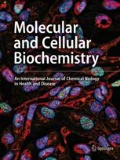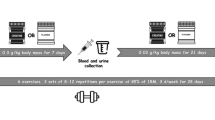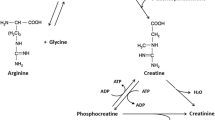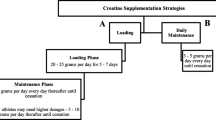Abstract
Creatine has been reported to be an effective ergogenic aid for athletes. However, concerns have been raised regarding the long-term safety of creatine supplementation. This study examined the effects of long-term creatine supplementation on a 69-item panel of serum, whole blood, and urinary markers of clinical health status in athletes. Over a 21-month period, 98 Division IA college football players were administered in an open label manner creatine or non-creatine containing supplements following training sessions. Subjects who ingested creatine were administered 15.75 g/day of creatine monohydrate for 5 days and an average of 5 g/day thereafter in 5–10 g/day doses. Fasting blood and 24-h urine samples were collected at 0, 1, 1.5, 4, 6, 10, 12, 17, and 21 months of training. A comprehensive quantitative clinical chemistry panel was determined on serum and whole blood samples (metabolic markers, muscle and liver enzymes, electrolytes, lipid profiles, hematological markers, and lymphocytes). In addition, urine samples were quantitatively and qualitative analyzed to assess clinical status and renal function. At the end of the study, subjects were categorized into groups that did not take creatine (n = 44) and subjects who took creatine for 0–6 months (mean 4.4 ± 1.8 months, n = 12), 7–12 months (mean 9.3 ± 2.0 months, n = 25), and 12–21 months (mean 19.3 ± 2.4 months, n = 17). Baseline and the subjects' final blood and urine samples were analyzed by MANOVA and 2 × 2 repeated measures ANOVA univariate tests. MANOVA revealed no significant differences (p = 0.51) among groups in the 54-item panel of quantitative blood and urine markers assessed. Univariate analysis revealed no clinically significant interactions among groups in markers of clinical status. In addition, no apparent differences were observed among groups in the 15-item panel of qualitative urine markers. Results indicate that long-term creatine supplementation (up to 21-months) does not appear to adversely effect markers of health status in athletes undergoing intense training in comparison to athletes who do not take creatine.
Similar content being viewed by others
References
Williams MH, Branch JD: Creatine supplementation and exercise performance: An update. J Am Coll Nutr 17: 216-234, 1998
Kreider R: Creatine supplementation: Analysis of ergogenic value, medical safety, and concerns. J Exerc Physiol Online 1: 7-18, 1998. Available: http://www.css.edu/users/tboone2/asep/jan3.htm
Williams MH, Kreider R, Branch JD: In: Creatine: The Power Supplement. Human Kinetics Publishers, Champaign, IL, 1999
Balsom PD, Soderlund K, Ekblom B: Creatine in humans with special reference to creatine supplementation. Sports Med 18: 268-280, 1994
Greenhaff P: The nutritional biochemistry of creatine. J Nutr Biochem 11: 610-618, 1997
Hultman E, Soderlund K, Timmons JA, Cederblad G, Greenhaff PL: Muscle creatine loading in men. J Appl Physiol 81: 232-237, 1996
Kraemer WJ, Volek JS: Creatine supplementation. Its role in human performance. Clin Sports Med 18: 651-666, 1999
Bessman S, Savabi F: The role of phosphocreatine energy shuttle in exercise and muscle hypertrophy. In: M.A. Conway, J. F. Clark (eds). Creatine and Creatine Phosphate: Scientific and Clinical Perspectives. Academic Press, San Diego, CA, 1988, pp 185-198
Ma TM, Friedman DL, Roberts R: Creatine phosphate shuttle pathway in tissues with dynamic energy demand. In: M.A. Conway, J.F. Clark (eds). Creatine and Creatine Phosphate: Scientific and Clinical Perspectives. Academic Press, San Diego, CA, 1996, pp 17-32.
Wallimann T, Dolder M, Schlattner U, Eder M, Hornemann T, O'Gorman E, Ruck A, Brdiczka D: Some new aspects of creatine kinase (CK): Compartmentation, structure, function and regulation for cellular and mitochondrial bioenergetics and physiology. Biofactors 8: 229-234, 1998
Vorgerd M, Grehl T, Jager M, Muller K, Freitag G, Patzold T, Bruns N, Fabian K, Tegenthoff M, Mortier W, Luttmann A, Zange J, Malin JP: Creatine therapy in myophosphorylase deficiency (McArdle disease): A placebo-controlled crossover trial. Arch Neurol 57: 956-963, 2000
Leuzzi V, Bianchi MC, Tosetti M, Carducci C, Cerquiglini CA, Cioni G, Antonozzi I: Brain creatine depletion: Guanidinoacetate methyltransferase deficiency (improving with creatine supplementation). Neurology 55: 1407-1409, 2000
Stockler S, Hanefeld F: Guanidinoacetate methyltransferase deficiency: A newly recognized inborn error of creatine biosynthesis. Wiener Klinische Wochenschrift 109: 86-88, 1997
Stockler S, Hanefeld F, Frahm J: Creatine replacement therapy in guanidinoacetate methyltransferase deficiency, a novel inborn error of metabolism. Lancet 21: 789-790, 1996
Ganesan V, Johnson A, Connelly A, Eckhardt S, Surtees RA: Guanidinoacetate methyltransferase deficiency: New clinical features. Pediatr Neurol 17: 155-157, 1997
Willer B, Stucki G, Hoppeler H, Bruhlmann P, Krahenbuhl S: Effects of creatine supplementation on muscle weakness in patients with rheumatoid arthritis. Rheumatology (Oxford) 39: 293-298, 2000
Felber S, Skladal D, Wyss M, Kremser C, Koller A, Sperl W: Oral creatine supplementation in Duchenne muscular dystrophy: A clinical and 31P magnetic resonance spectroscopy study. Neurol Res 22: 145-150, 2000
Valtonen M, Nanto-Salonen K, Jaaskelainen S, Heinanen K, Alanen A, Heinonen OJ, Lundbom N, Erkintalo M, Simell O: Central nervous system involvement in gyrate atrophy of the choroid and retina with hyperornithinaemia. J Inherit Metab Dis 22: 855-866, 1999
Tarnopolsky MA, Parise G: Direct measurement of high-energy phosphate compounds in patients with neuromuscular disease. Muscle Nerve 22: 1228-1233, 1999
Heinanen K, Nanto-Salonen K, Komu M, Erkintalo M, Alanen A, Heinonen OJ, Pulkki K, Nikoskelainen E, Sipila I, Simell O: Creatine corrects muscle 31P spectrum in gyrate atrophy with hyperornith-inaemia. Eur J Clin Invest 29: 1060-1065, 1999
Tarnopolsky MA, Roy BD, MacDonald JR: A randomized, controlled trial of creatine monohydrate in patients with mitochondrial cytopathies. Muscle Nerve 20: 1502-1509, 1997
Hespel P, Eijnde BO, Van Leemputte M, Urso B, Greenhaff PL, Labarque V, Dymarkowski S, Van Hecke P, Richter EA: Oral creatine supplementation facilitates the rehabilitation of disuse atrophy and alters the expression of muscle myogenic factors in humans. J Physiol 536: 625-633, 2001
Terjung RL, Clarkson P, Eichner ER, Greenhaff PL, Hespel PJ, Israel RG, Kraemer WJ, Meyer RA, Spriet LL, Tarnopolsky MA, Wagenmakers AJ, Williams MH: American College of Sports Medicine roundtable. The physiological and health effects of oral creatine supplementation. Med Sci Sports Exerc 32: 706-717, 2000
Benzi G: Is there a rationale for the use of creatine either as nutritional supplementation or drug administration in humans participating in a sport? Pharmacol Res 41: 255-264, 2000
Benzi G, Ceci A: Creatine as nutritional supplementation and medicinal product. J Sports Med Phys Fitness 41: 1-10, 2001
Graham AS, Hatton RC: Creatine: A review of efficacy and safety. J Am Pharm Assoc (Wash) 39: 803-810; quiz 875–807, 1999
Juhn MS, Tarnopolsky M: Potential side effects of oral creatine supplementation: A critical review. Clin J Sport Med 8: 298-304, 1998
Yu PH, Deng Y: Potential cytotoxic effect of chronic administration of creatine, a nutrition supplement to augment athletic performance. Med Hypotheses 54: 726-728, 2000
Papadopoulos C, Imamura R, Bandon LJ: The effect of creatine supplementation on repeated bouts of high-intensity exercise in the heat. Med Sci Sports Exerc 33: S203, 2001
Kern M, Podewils LJ, Vukovich M, Buono MJ: Physiological response to exercise in the heat following creatine supplementation. J Exerc Physiol Online 4: 18-27, 2001. Available:http://www.css.edu/users/tboone12/asep/Kern.pdf
Volek JS, Mazzetti SA, Farquhar WB, Barnes BR, Gomez AL, Kraemer WJ: Physiological responses to short-term exercise in the heat after creatine loading. Med Sci Sports Exerc 33: 1101-1108, 2001
McArthur PD, Webster MJ, Body JC, May RA, Eschbach LD, Eimer AF, Angelosoulos TJ, Zoeller RF, Krebs GV: Creatine supplementation and acute dehydration. Med Sci Sports Exerc 31: S263, 1999
Webster MJ, Vogel RA, Erdmann LD, Clark RD: Creatine supplementation: Effect on exercise performance at two levels of acute dehydration. Med Sci Sports Exerc 31: S263, 1999
Greenwood M, Kreider R, Rasmussen C, Ransom J, Melton C, Stroud T, Cantler E, Milnor P: Creatine supplementation does not increase incidence of cramping or injury during college football training II. J Strength Cond Res 13: 425-426, 1999
Kreider R, Melton C, Hunt J, Rasmussen C, Ransom J, Stroud T, Cantler E, Milnor P: Creatine does not increase incidence of cramping or injury during pre-season college football training 1. Med Sci Sports Exerc 31: S355, 1999
Greenwood M, Greenwood LD, Kreider R, Byars A: Effects of creatine supplementation on the incidence of cramping/injury during college football three a day training. Med Sci Sports Exerc 32: S136, 2000
Greenwood LD, Greenwood M, Kreider R, Byars A: Effects of creatine supplementation on the incidence of cramping/injury during collegiate fall baseball. Med Sci Sports Exerc 32: S136, 2000
Greenwood M, Farris J, Kreider R, Greenwood L, Byars A: Creatine supplementation patterns and perceived effects in select division I collegiate athletes. Clin J Sport Med 10: 191-194, 2000
Greenwood M, Kreider R, Melton C, Rasmussen C, Lancaster S, Cantler E, Milnor P, Almada AL: Creatine supplementation during college football training does not increase the incidence of cramping or injury. Abstracts of 6th International Conference on Guanidino Compounds in Biology and Medicine, Cincinnati, OH, September 1, 2001
Hulver MW, Campbell A, Haff G, Schroeder C, Comeau M, Potteiger JA: The effects of creatine supplementation on total body fluids, performance, and muscle cramping during exercise. Med Sci Sports Exerc 32: S133, 2000
Hunt J, Kreider R, Melton C, Ransom J, Rasmussen C, Stroud T, Cantler E, Milnor P: Creatine does not increase incidence of cramping or injury during pre-season college football training II. Med Sci Sports Exerc 31: S355, 1999
Kreider R, Rasmussen C, Ransom J, Almada AL: Effects of creatine supplementation during training on the incidence of muscle cramping, injuries and GI distress. J Strength Cond Res 12: 275, 1998
Kreider R, Melton C, Ransom J, Rasmussen C, Stroud T, Cantler E, Greenwood M, Milnor P: Creatine supplementation does not increase incidence of cramping or injury during college football training I. J Strength Cond Res 13: 428, 1999
Almada AL, Kreider R, Melton C, Rasmussen C, Lundberg J, Ransom J, Greenwood M, Stroud T, Cantler E, Milnor P, Fox J: Long-term creatine supplementation does not affect markers of renal stress in athletes. J Strength Cond Res 14: 359, 2000
Earnest CP, Almada A, Mitchell TL: Influence of chronic creatine supplementation on hepatorenal function. FASEB J 10: A790, 1996
Kreider R, Ransom J, Rasmussen C, Hunt J, Melton C, Stroud T, Cantler E, Milnor P: Creatine supplementation during pre-season football training does not affect markers of renal function. FASEB J 13: A543, 1999
Kuehl K, Soehler S, Kulacki K, Goldberg L, Elliot D, Bennett W, Haddock B: Effects of oral creatine monohydrate supplementation on renal function in adults. Med Sci Sports Exerc 32: S168, 2000
Poortmans JR, Francaux M: Long-term oral creatine supplementation does not impair renal function in healthy athletes. Med Sci Sports Exerc 31: 1108-1110, 1999
Poortmans JR, Auquier H, Renaut V, Durussel A, Saugy M, Brisson GR: Effect of short-term creatine supplementation on renal responses in men. Eur J Appl Physiol Occup Physiol 76: 566-567, 1997
Rasmussen C, Kreider R, Melton C, Ransom J, Stroud T, Cantler E, Greenwood M, Milnor P: Long-term creatine supplementation during football training does not affect markers of renal stress. J Strength Cond Res 13: 431, 1999
Robinson TM, Sewell DA, Casey A, Steenge G, Greenhaff PL: Dietary creatine supplementation does not affect some haematological indices, or indices of muscle damage and hepatic and renal function. Br J Sports Med 34: 284-288, 2000
Bemben MG, Bemben DA, Loftiss DD, Knehans AW: Creatine supplementation during resistance training in college football athletes. Med Sci Sports Exerc 33: 1667-1673, 2001
Bermon S, Venembre P, Sachet C, Valour S, Dolisi C: Effects of creatine monohydrate ingestion in sedentary and weight-trained older adults. Acta Physiol Scand 164: 147-155, 1998
Eijnde BO, Hespel P: Short-term creatine supplementation does not alter the hormonal response to resistance training. Med Sci Sports Exerc 33: 449-453, 2001
Greenwood M, Kreider R, Melton C, Rasmussen C, Lundberg J, Stroud T, Cantler E, Milnor P, Almada AL: Short-and long-term creatine supplementation does not affect hematological markers of health. J Strength Cond Res 14: 362-363, 2000
Kreider R, Rasmussen C, Melton C, Greenwood M, Stroud T, Ransom J, Cantler E, Milnor P, Almada AL: Long-term creatine supplementation does not adversely affect clinical markers of health. Med Sci Sports Exerc 32: S134, 2000
Poortmans JR, Francaux M: Adverse effects of creatine supplementation: fact or fiction? Sports Med 30: 155-170, 2000
Sipila I, Rapola J, Simell O, Vannas A: Supplementary creatine as a treatment for gyrate atrophy of the choroid and retina. New Engl J Med 304: 867-870, 1981
Vannas-Sulonen K, Sipila I, Vannas A, Simell O, Rapola J: Gyrate atrophy of the choroid and retina. A five-year follow-up of creatine supplementation. Ophthalmology 92: 1719-1727, 1985
Schilling BK, Stone MH, Utter A, Kearney JT, Johnson M, Coglianese R, Smith L, O'Bryant HS, Fry AC, Starks M, Keith R, Stone ME: Creatine supplementation and health variables: a retrospective study. Med Sci Sports Exerc 33: 183-188, 2001
Stone MH, Schilling BK, Fry AC, Johnson M, Keith RE, Kearney JT, Coglianese RH, Stone ME, Utter A, Smith L, O'Bryant HS: A retrospective study of long-term creatine supplementation on blood markers of health. J Strength Cond Res 13: 433, 1999
Juhn MS, O'Kane JW, Vinci DM: Oral creatine supplementation in male collegiate athletes: a survey of dosing habits and side effects. J Am Diet Assoc 99: 593-595, 1999
Ray TR, Eck JC, Covington LA, Murphy RB, Williams R, Knudtson J: Use of oral creatine as an ergogenic aid for increased sports performance: Perceptions of adolescent athletes. South Med J 94: 608-612, 2001
Sheppard HL, Raichada SM, Kouri KM, Stenson-Bar-Maor L, Branch JD: Use of creatine and other supplements by members of civilian and military health clubs: Across-sectional survey. Int J Sport Nutr Exerc Metab 10: 245-259, 2000
Smith J, Dahm DL: Creatine use among a select population of high school athletes. Mayo Clin Proc 75: 1257-1263, 2000
Stephens MB, Olsen C: Ergogenic supplements and health risk behaviors. J Fam Pract 50: 696-699, 2001
Metzl JD, Small E, Levine SR, Gershel JC: Creatine use among young athletes. Pediatrics 108: 421-425, 2001
Greenwood M, Kreider R, Greenwood LD, Comeau M, Brown LE, Stahura K, Byars A: Perceived health status and side-effects associated with creatine supplementation during the collegiate baseball season. Med Sci Sports Exerc 33: S205, 2001
Kuehl K, Goldber L, Elliot D: Renal insufficiency after creatine supplementation in a college football athlete. Med Sci Sports Exerc 30: S235, 1998
Pritchard NR, Kalra PA: Renal dysfunction accompanying oral creatine supplements. Lancet 351: 1252-1253, 1998
Koshy KM, Griswold E, Schneeberger EE: Interstitial nephritis in a patient taking creatine. N Engl J Med 340: 814-815, 1999
Loud K, Rozycki A, Chobanian M: Creatine nephropathy — Lacrosse. Med Sci Sports Exerc 33: S10, 2001
Poortmans JR, Francaux M: Renal dysfunction accompanying oral creatine supplements. Lancet 352: 234, 1998
Greenhaff P: Renal dysfunction accompanying oral creatine supplements. Lancet 352: 233-234, 1998
Kreider RB, Ferreira M, Wilson M, Grindstaff P, Plisk S, Reinardy J, Cantler E, Almada AL: Effects of creatine supplementation on body composition, strength, and sprint performance. Med Sci Sports Exerc 30: 73-82, 1998
Ziegenfuss TN, Lowery LM, Lemon PWR: Acute fluid volume changes in men during three days of creatine supplementation. J Exerc Physiol Online 1: 1-9, 1998. Available: http://www.css.edu/users/tboone2/asep/jan3.htm
Rasmussen C, Kreider R, Ransom J, Hunt J, Melton C, Stroud T, Cantler E, Milnor P: Creatine supplementation during pre-season football training does not affect fluid or electrolyte status. Med Sci Sports Exerc 31: S299, 1999
Earnest CP, Almada A, Mitchell TL: High-performance capillary electrophoresis-pure creatine monohydrate reduced blood lipids in men and women. Clin Sci 91: 113-118, 1996
Arciero PJ, Hannibal III N, Hamed J, Gentile C: Effect of creatine on resting metabolic rate, body composition, strength, and blood cholesterol. Med Sci Sports Exerc 31: S264, 1999
Dulacki K, Kuehl K, Koehler S, Elliot D, Goldberg L: Effects of creatine on body composition, strength, maximal aerobic capacity, cholesterol and gender. Med Sci Sports Exerc 32: S135, 2000
Volek JS, Duncan ND, Mazzetti SA, Putukian M, Gomez AL, Kraemer WJ: No effect of heavy resistance training and creatine supplementation on blood lipids. Int J Sport Nutr Exerc Metab 10: 144-156, 2000
Melton C, Kreider R, Rasmussen C, Ransom J, Hunt J, Stroud T, Cantler E, Milnor P: Effects of ingesting creatine containing supplements during training on blood lipid profiles. FASEB J 13: A559, 1999
Author information
Authors and Affiliations
Rights and permissions
About this article
Cite this article
Kreider, R.B., Melton, C., Rasmussen, C.J. et al. Long-term creatine supplementation does not significantly affect clinical markers of health in athletes. Mol Cell Biochem 244, 95–104 (2003). https://doi.org/10.1023/A:1022469320296
Issue Date:
DOI: https://doi.org/10.1023/A:1022469320296




